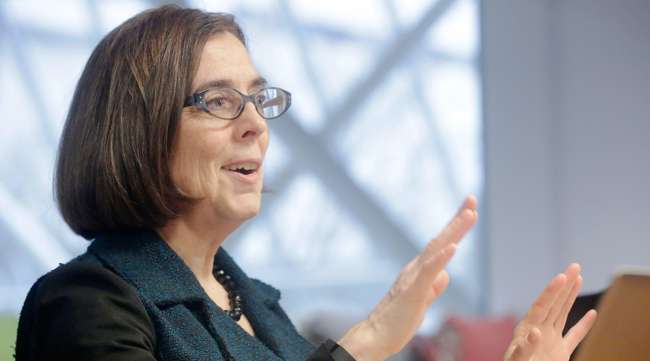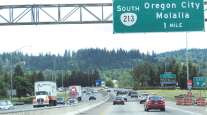Oregon Lawmakers to Finally Vote on Massive Road-Fixes Bill After Two Years of Talks

During a rare weekend meeting, Oregon state lawmakers on July 1 voted to send a slimmed-down, $5.3 billion proposal to raise taxes and fees to pay for transportation projects to the House floor for a full vote.
Moving the proposal out of committee is a major accomplishment for lawmakers and Democratic leaders, and it signals that the bill has the needed votes to pass both chambers. Lawmakers have been pushing for two sessions to pass legislation that would upgrade roads and bridges statewide. Getting such a bill passed this year is a central part of Gov. Kate Brown’s agenda.
The agreement Brown announced involved watering down a proposal that originally raised at least $8 billion to one that would raise an estimated $5.3 billion. Under the revised bill, fewer projects will be completed and timelines will be stretched out for those that are built. But lawmakers say the plan is politically viable and can achieve the required three-fifths approval in both chambers for tax-raising bills to pass.
The last time transportation negotiations took place, in 2015, a group of eight lawmakers sequestered themselves behind closed doors to hammer out a deal that ultimately failed without a vote. This year, a special committee of 14 select lawmakers traveled the state to hold public hearings on transportation proposals. They then crafted their bill mostly in the open before reverting to closed-door talks to smooth out the final details.
Drafting the proposal has been a roller coaster ride of sorts for lawmakers, some of whom felt confident the plan would pass or fail, only to have the situation change hour-by-hour. It was just last week that the entire proposal appeared imperiled because lawmakers — facing pressure from Capitol leaders and moneyed interest groups — couldn’t agree on its details. But on June 28 Brown announced that a bipartisan deal had been struck.
Under the bill advanced July 1, a bevy of taxes and fees would be increased, along with establishing new ones:
- Statewide gas tax increase of 4 cents to 34 cents per gallon plus another 6-cent increase if certain conditions are met
- Tiered vehicle registration fees where owners of high-MPG cars and electric cars pay more
- A statewide payroll tax of 0.1%
- A fee of $15 per adult bicycle that costs $200 or more
- A tax of 0.5% of the retail sales price on new cars sold in Oregon and of cars sold in other states but brought to Oregon
- A plan to ask the federal government for permission to put tolls on Interstate 5 and Interstate 205 through Portland and to the Washington state line
One aspect of the deal reached by lawmakers involves acquiescing to Republican demands to modify the state’s low-carbon fuel standard, or “clean fuels” law. In 2015, Republicans sought to repeal the law outright and criticized it by saying it would increase the cost of gas. But this year Republicans came out of their corner. Instead of repealing the clean fuels law, they said they would settle for capping its costs and ordering the state to build a website that publishes the law’s effect on fuel prices.
Democratic leaders at first said they would not relent to that demand. But they eventually agreed in order to earn Republican votes. At least one Republican vote is needed in both the House and Senate to achieve the required three-fifths majority to pass tax bills.
Part of the compromise also includes establishing a program to provide incentives for purchasing electric cars. Language adopted July 1 would create rebates of up to $2,500 for purchasing new electric vehicles or leasing new electric vehicles for at least two years.
Under the original $8 billion proposal, which was released to the public in May, taxes and fees would have been raised even higher. There also would have been special gas taxes and registration fees established just for the Portland area. That language was scrapped after pushback from interest groups.
Those Portland-specific fees would have paid for highway expansion projects on Interstate 5 through the Rose Quarter, Interstate 205 and Oregon 217. Under the new language, the Rose Quarter project still receives funding.
But projects to widen I-205 and replace the Abernethy Bridge near West Linn would be funded by tolls, if approved by the federal government. Funding for projects to add lanes to OR-217 in both directions is not secured, a change from the original bill.
Lawmakers could vote on the transportation proposal as soon as July 5, the next time the House convenes. There is little time to delay: the annual session must adjourn by July 10.
Distributed by Tribune Content Agency, LLC




